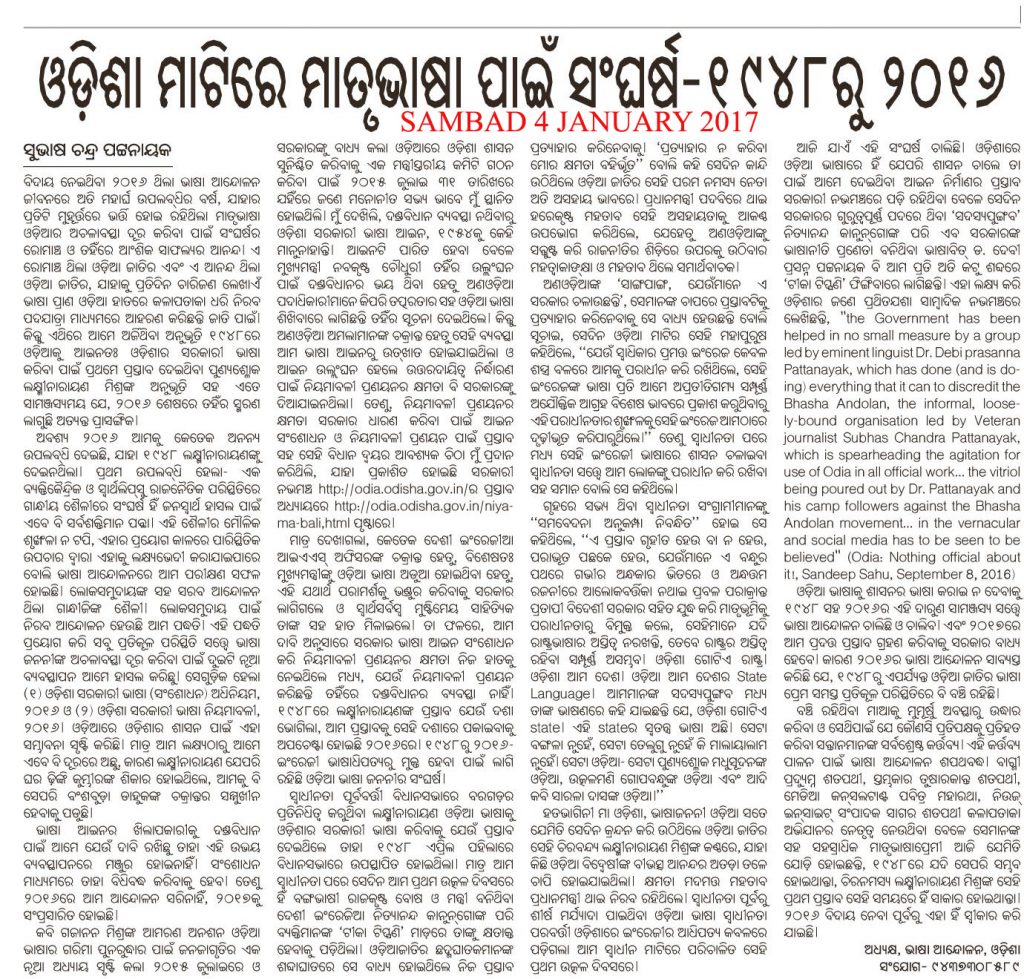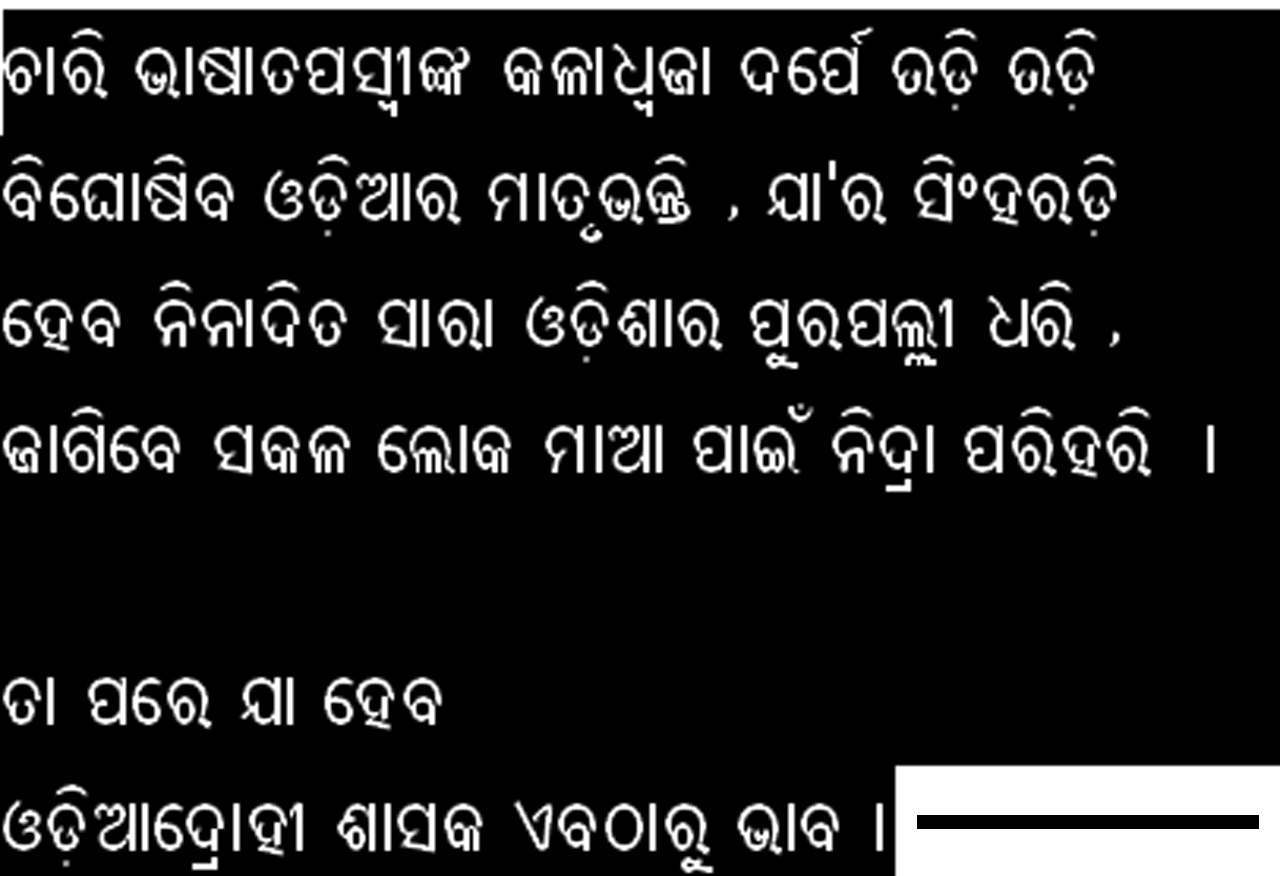Subhas Chandra Pattanayak

PDF original:
ସୁଭାଷ ଚନ୍ଦ୍ର ପଟ୍ଟନାୟକ
ଯେଉଁ ସମ୍ବଲପୁରର ଭାଷା ଜାତୀୟତା ଭାଷାଭିତ୍ତିକ ଓଡ଼ିଶା ପ୍ରଦେଶର ଆବିର୍ଭାବ ଘଟାଇଥିଲା , ସେହି ସମ୍ବଲପୁରରେ ୧୨ ତାରିଖରୁ ଆରମ୍ଭ ହୋଇଯାଇଛି ଓଡ଼ିଆ ଭାଷାରେ ଓଡ଼ିଶାର ପରିଚାଳନା ପାଇଁ କଳାପତାକା ଅଭିଯାନ । ତା ପୂର୍ବରୁ ଓଡ଼ିଶା ସୃଷ୍ଟିରେ ସମ୍ବଲପୁରର ଅବଦାନ ସମ୍ପର୍କରେ ମୋର କେତେକ ନିବନ୍ଧ , ଯଥା – “ଚନ୍ଦ୍ରଶେଖର ବେହେରଙ୍କଠାରୁ ଲକ୍ଷ୍ମୀନାରାୟଣ ମିଶ୍ର” ନୀତିଦିନର ୧୧.୩.୨୦୧୭ତାରିଖର ସଂସ୍କରଣରେ ପ୍ରକାଶ ପାଇ ସମ୍ବଲପୁରରେ ଭାଷା ଅସ୍ମିତାର ପୁନର୍ଜାଗରଣ ଘଟାଇଥାଏ । ସେହି ପୁନର୍ଜାଗରଣକୁ ବଳବତ୍ତର କରିଥିଲା ମୋ ନିବନ୍ଧ “ଓଡ଼ିଆ ଭାଷା ଓ ସମ୍ବଲପୁର” ଦୈନିକ ସୂର୍ଯ୍ୟପ୍ରଭାର ୧୨.୩.୨୦୧୭ ତାରିଖର ସଂସ୍କରଣରେ ଏବଂ “ସମ୍ବଲପୁର, ଓଡ଼ିଆ ଭାଷା: ଅତୀତରୁ ବର୍ତ୍ତମାନ” ୧୮.୩.୨୦୧୭ ତାରିଖର ପ୍ରମେୟରେ । ଭାଷା ଆନ୍ଦୋଳନକୁ ମୁଁ ଦେଇଥିବା ଏହି ଶକ୍ତିଶାଳୀ ସାହିତ୍ୟ ସହାୟତାରେ ଓଡ଼ିଶାର ପଶିମ ବାହିରେ କଳାପତାକା ଅଭିଯାନ ଯେତେବେଳେ ତୀବ୍ର ହୋଇଛି, ଏବଂ କ୍ଷମତା ରାଜନୀତି ସହ କୌଣସି ସମ୍ପର୍କ ନଥିବା ବହୁ ବୁଦ୍ଧିଜୀବୀ ଯେତେବେଳେ ଏହି ଆନ୍ଦୋଳନକୁ ସମର୍ଥନ କରି କାଳବିଳମ୍ବ ନକରି ଓଡ଼ିଆରେ ଓଡ଼ିଶା ଶାସନ ସୁନିଶ୍ଚିତ କରିବାକୁ ରାଜ୍ୟ ସରକାରଙ୍କୁ ପରାମର୍ଶ ଦେଇଚାଲିଛନ୍ତି, ସେତେବେଳେ ନବୀନ ପଟ୍ଟନାୟକଙ୍କ ସରକାର କାହିଁକି ନିଜର ଭୁଲ ସଂଶୋଧନ କରି ଭାଷା ଆଇନକୁ ନିର୍ଭୁଲ କରୁନାହିଁ ?
ଏହା ହିଁ ସତ୍ୟ ଯେ, ୧୯୫୪ରେ ପ୍ରଣୀତ ଓଡ଼ିଶା କାର୍ଯ୍ୟାଳୟ ଭାଷା ଆଇନ ଏଯାଏଁ କାର୍ଯ୍ୟକାରୀ ହୋଇନାହିଁ । କାହିଁକି ହୋଇନାହିଁ ? ଓଡ଼ିଶା ରାଜନୀତିରେ ବିଜୁ ପଟ୍ଟନାୟକଙ୍କ କାଳରୁ ରାଜନୈତିକ ସ୍ତରକୁ ବ୍ୟାଧି ପରି ଗ୍ରାସିଯାଇଥିବା ଇଂରାଜୀ ଭାଷାମନସ୍କତା ତ ଏକ ମୁଖ୍ୟକାରଣ । ମାତ୍ର ଭାଷା ଆଇନ ପ୍ରଣେତା ନବବାବୁଙ୍କ ସମୟରେ ମଧ୍ୟ ଓଡ଼ିଆରେ ଆଶାଜନକ ଭାବେ ଚାଲି ନଥିଲା ଓଡ଼ିଶାର ଶାସନ । କାରଣ, ଓଡ଼ିଆ ଭାଷା ପ୍ରତି ବିମୁଖତା ତଳିଆ ଅମଲାତନ୍ତ୍ରରେ ଭରିହୋଇରହିଥିଲା । ମୁଖ୍ୟମନ୍ତ୍ରୀ ଚୌଧୁରୀ ସେହି ଖଳନାୟକମାନଙ୍କୁ ଠାବ କରିଥିଲେ । ଏହି ନିବନ୍ଧରେ ମୁଁ ଆପଣଙ୍କୁ ସେଇଠିକି ନେଇଯିବି ।
ଭାଷା ଆଇନ କରାଇ ନଦେବା ପାଇଁ ଅଣଓଡ଼ିଆ ଶାସନ ସଚିବମାନେ ଚକ୍ରାନ୍ତ ଚଳାଇଥିବା ଆପାତତଃ ସମସ୍ତକୁ ଜଣାଥିଲା । ତେଣୁ, ଜୁନାଗଡ଼ର ପ୍ରତିନିଧି, କଳାହାଣ୍ଡିର ପୂର୍ବତନ ମହାରାଜା ପ୍ରତାପ କେଶରୀ ଦେଓ କହିଥିଲେ, “ଏଇଟା ମନେ ରଖିବାକୁ ହେବ ଯେ, ଅଚିରେ ଓଡ଼ିଆ State Language ହୋଇଯିବ ଏବଂ ବିଭାଗୀୟ ସମସ୍ତ କାଗଜପତ୍ର ଓଡ଼ିଆ ଭାଷାରେ ହେବ । ସେହି ହେତୁରୁ, ଯେଉଁମାନେ ଓଡ଼ିଶାରେ ବାସ କରିବାକୁ ଚାହାନ୍ତି, ସେମାନଙ୍କୁ ଓଡ଼ିଆ ନିଶ୍ଚୟ ଶିଖିବାକୁ ପଡ଼ିବ । ସେ ଆମର ଜଣେ ଆନ୍ଧ୍ର ଭାଇ ହୁଅନ୍ତୁ କିମ୍ବା ସେ ଆମର ଚିଫ୍ ସେକ୍ରେଟାରୀ ହୁଅନ୍ତୁ ଅଥବା ଯେ କେହି ହୁଅନ୍ତୁ , ସମସ୍ତଙ୍କୁ ଓଡ଼ିଆ ଶିଖିବାକୁ ହେବ ; they must learn Oriya or else they will have to clear out” (ବିଧାନସଭା ବିବରଣୀ, Vol. VI–No. 4, p. 32) ।
ଅଣଓଡ଼ିଆ ଅଧିକାରୀମାନଙ୍କ ମାନସିକତା ଶ୍ରୀ ଦେଓଙ୍କ କଥାରେ ପରିସ୍ଫୁଟିତ ହୋଇଥିବା ବେଳେ, ଓଡ଼ିଆ ଭାଷା ବିରୁଦ୍ଧରେ କିରାଣୀମାନଙ୍କ ମାନସିକତାର ଏକ ଆଲୋକବର୍ଷୀ ଉପସ୍ଥାପନା କରିଥିଲେ ନିଜେ ମୁଖ୍ୟମନ୍ତ୍ରୀ ଶ୍ରୀ ଚୌଧୁରୀ । “୩ ବର୍ଷ ପରେ ଓଡ଼ିଆ ନଜାଣିଥିବା ଲୋକଙ୍କୁ ଦଣ୍ଡ ଦିଆଯିବା ବ୍ୟବସ୍ଥା ହେଉଛି” ବୋଲି ଜାଣି “ଅଣଓଡ଼ିଆ ଅଫିସରମାନେ ଓଡ଼ିଆ କହିବାକୁ ଓ ଲେଖିଶିଖିବାକୁ ଉତ୍ସାହର ସହିତ ଲାଗିପଡ଼ିଛନ୍ତି” ବୋଲି ସୂଚାଇ ସେ କହିଥିଲେ, “ସେମାନଙ୍କ ସହ ଆମର ଯେଉଁ ଆଲୋଚନା ହୁଏ, ସେଥିରେ ସେମାନେ ଓଡ଼ିଆରେ ଆଲୋଚନା କରନ୍ତି । କିନ୍ତୁ ଆମ ଓଡ଼ିଆ ମରହଟିଆ କିରାଣୀମାନେ କହନ୍ତି ଯେ, ଆମେ ବରାବର ଇଂରାଜୀରେ ଲେଖିଆସିଲୁ , ଆଜି କ’ଣ ଓଡ଼ିଆରେ ଲେଖିବୁ ?” (ଏଯନ ପୃ ୫୫ )।
ବ୍ୟାଧିଟି ଏଇଠି ।
ନୀଳବର୍ଣ୍ଣ ଶୃଗାଳ ପରି ଏହି କିରାଣୀମାନେ ଓଡ଼ିଆ କୁଳରେ ଜନ୍ମ ହୋଇ ମଧ୍ୟ ନିଜକୁ ସାଧାରଣ ଓଡ଼ିଆଠାରୁ ଅଧିକ ଉନ୍ନତ ବୋଲି ଦେଖେଇହେବାକୁ ନଥିରେ ଇଂରାଜୀ ଚାଷ କରନ୍ତି । ଏମାନେ ଫକୀରମୋହନଙ୍କ ‘ଡାକ ମୁନ୍ସି’ ଗପର ଗୋପାଳ ଠାରୁ କେଉଁ ଗୁଣରେ ଊଣା ନୁହନ୍ତି । ଏମାନେ ସମସ୍ତେ ଓଡ଼ିଆ । ଏମାନେ ଚାହିଁଥିଲେ, ଓଡ଼ିଶାରେ ଓଡ଼ିଆରେ କାମ ହେଉବୋଲି ଆମକୁ ଆଜି ଆନ୍ଦୋଳନ କରିବାକୁ ପଡୁ ନଥାନ୍ତା । ନବବାବୁ ଠାବ କରିଥିବା ଏହି ପ୍ରଜାତିର କର୍ମଚାରୀମାନଙ୍କ ଇଂରାଜୀମନସ୍କତା ନବୀନ ପଟ୍ଟନାୟକଙ୍କ ଓଡ଼ିଆ ବିଦ୍ଵେଷ ସହ ମିଶି ଆଜି ଓଡ଼ିଶା ପ୍ରଦେଶ ସୃଷ୍ଟିର ଉଦ୍ଦେଶ୍ୟ ପଣ୍ଡ କରିବାକୁ ବସିଛି ।
ସମୟ ଆସିଛି, ଓଡ଼ିଆ ଜାତି ତା’ର ଏହି କୁଳନନ୍ଦନମାନଙ୍କୁ କାନରଗଡ଼ି ଶୃଙ୍ଖଳିତ କରିବା ପାଇଁ । କଠୋର ଦଣ୍ଡବିଧାନ ବ୍ୟତୀତ ଏହି ଦେଶୀ ଇଂରାଜିଆମାନଙ୍କୁ ଶୃଙ୍ଖଳା ଶିଖାଇବା ଅସମ୍ଭବ ।
କିରାଣୀ ହୁଅନ୍ତୁ କି ମୁଖ୍ୟ ଶାସନ ସଚିବ, ମୁଖ୍ୟମନ୍ତ୍ରୀ ହୁଅନ୍ତୁ କି ଅନ୍ୟ ଯେ କେହି ହୁଅନ୍ତୁ, ଓଡ଼ିଶାର ପାଣିପବନରେ ରହୁଥିବା, ଓଡ଼ିଆ ଲୋକଙ୍କଠାରୁ ଦାନାପାଣି ସଂଗ୍ରହ କରୁଥିବା, ଓଡ଼ିଶା ରାଜକୋଷରୁ ବେତନ ଭତ୍ତା ପାଉଥିବା ଅଥଚ ଓଡ଼ିଶା କାର୍ଯ୍ୟାଳୟ ଭାଷା ଆଇନର ଅମର୍ଯ୍ୟାଦା କରୁଥିବା ଲୋକକୁ କଠିନ ଦଣ୍ଡ ବିଧାନ କରିବାକୁ ହେବ । ମାନ୍ୟବର ପ୍ରତାପ କେଶରୀ ଦେଓଙ୍କ ଉପରୋଦ୍ଧୃତ୍ତ ଭାଷାରେ କହିବାକୁ ହେବ, “ସେ ଆମର ଚିଫ୍ ସେକ୍ରେଟାରୀ ହୁଅନ୍ତୁ ଅଥବା ଯେ କେହି ହୁଅନ୍ତୁ , ସମସ୍ତଙ୍କୁ ଓଡ଼ିଆ ଶିଖିବାକୁ ହେବ ; they must learn Oriya or else they will have to clear out. ”
ମୁଁ ନିଶ୍ଚିତ ଯେ, ଓଡ଼ିଆ ଜାତି ପ୍ରତି ନବୀନ ପଟ୍ଟନାୟକଙ୍କ ବିଶ୍ୱାସଘାତକତା ଆମ ଭାଷାକୁ ଓ ଆମ ଜାତୀୟ ପରିଚୟକୁ ଯେଉଁ ବିପଦ ଭିତରକୁ ଠେଲି ଦେଲାଣି, ଏହି ଓଡ଼ିଆଦ୍ରୋହୀ କର୍ମଚାରୀ ଓ ପଦାଧିକାରୀମାନଙ୍କୁ କଠିନ ଦଣ୍ଡବିଧାନ ବିନା ବିପତ୍ତି ନ ଟଳେ ।
ଏଥିପାଇଁ କଳାପତାକା ଅଭିଯାନକୁ ବ୍ୟାପକ କରିବାକୁ ହେବ ।
Subhas Chandra Pattanayak

Subhas Chandra Pattanayak
The present day Orissa was created in 1936 as the Oriya speaking people wanted a separate province of their own to have their official affairs managed in their mother tongue. The British power that was then in occupation of India had to bow to the Oriya movement and thus Orissa took her shape as the first Linguistic State of India.
But, post independence politicians – some belonging to the families of the same non-Oriya native servants of the British dragged mostly from Bengal and settled in Orissa; some eager to show off their elitism and knowledge in English; and others too simple to control non-Oriya officers of Indian Civil Service and indigenous officers of anglicized mentality – have ruined this position. The incumbent Chief Minister’s abhorrence for mother tongue of the people has rendered this splendid classical language de facto defunct. Like the masses and mass media of Orissa had fought for separate identity of their motherland, the masses and mass media of today’s Orissa are fighting for restoration of primacy and paramountcy of Oriya Language in governance of Orissa under the banner of Bhasha Andolan.
This movement has no parallel in the history of mankind. A team of four eminent Oriyas per day takes up the movement’s flag of unity – Black Flag – and walk silently on the most sensitive part of the capital city of Orissa starting from the Assembly to the Governor’s House passing through the citadel of power – the Secretariat – daily evening at five.
The movement, begun on 13 April (Orissa’s New Yeaar’s Day) 2016, had postponed its ‘Black Flag March’ on 24 May 2016, as bowing to its demand the CM had amended the Orissa Official Language Act,1954 on the 21st to facilitate formation of Rules to ensure governance of Orissa in Oriya, with a declaration to completely remove all obstacles from the way of implementation of the Act by August 15. But, he betrayed the people and the movement has resumed its ‘Black Flag March’ since the 16th August.
This book, published on the 9th August by ‘Shabdasparsha’ and formally released on 30th November, is a documentation of the unique movement from 13 April to 24 May, 2016.
We have made the book available on Scribd for the Oriyas of the world and their supporters.
Subhas Chandra Pattanayak
It is sad that the Legislative Assembly failed to use its legislative wisdom while passing the Odisha Official Language (Amendment) Bill 2016 verbatim the Odisha Official Language (Amendment) Ordinance, 2016. My discussion in print media at http://bhashaandolan.com/oriya-language-legislative-wisdom/ dwells on it.
The adopted Bill being verbatim what the bureaucracy wanted it to be, crippled with inherent deficiency that may need remedy through further amendment to implement the Odisha Official Language Act, 1954, Bhasha Andolan, Orissa has, in a letter to the Governor, requested him to return the same with advice to the Government to come up with a fault-free legislation. The same is placed here for documentation:
To:
The Hon’ble Governor of Odisha,
Raj Bhawan, Bhubaneswar.IN THE MATTER OF ODISHA OFFICIAL LANGUAGE
(AMENDMENT) BILL, 2016Hon’ble Sir,
The Odisha Official Language (Amendment) Bill, 2016, as passed in the State’s Legislative Assembly on 28 September 2016 deserves to be denied with assent on the following grounds:1. The Bill has replaced the Ordinance dated 21 May 2016. The said Ordinance was a creation by bureaucracy, which has neither legislative wisdom nor legislative power. Members while debating on it had pointed out various defects in the Bill, but sadly no addition or alteration was advanced. Resultantly, such a Bill has been passed that, if it gets your assent, it would be a law created by Non-lawmakers.
2. The Bill is in two languages: English and Oriya. The Oriya version is saturated with ambiguous and incorrect words. If the Bill is given assent, the same ambiguous and incorrect Oriya version of the Bill will also gain assent and be a law. This would cause unprecedented anarchy in implementation.
3. Section 66-A (1) of the Rules of Procedure and Conduct of Business in Orissa Legislative Assembly’ stipulates, “Whenever a Bill seeking to replace an Ordinance with or without modification is introduced in the House, there shall be placed before the House along with the Bill a Statement explaining the circumstances which had necessitated immediate legislation by ordinance”. This explanation is totally absent in the Objects and Reasons of the Bill.
4. The Bill has totally and deliberately failed to state the circumstances which had necessitated immediate legislation by an Ordinance in the statutory Statement, because the member-in-charge, the Chief Minister himself, was eager to suppress the fact that , Black Flag movement of Bhasha Andolan in demand for punishment to whosoever functionary contravenes the Orissa Official Language Act, 1954 be punished by creation of legislation for the same and that was the circumstance which had necessitated the Ordinance to create Rules for the purpose, as the Act had not given authority to the State to create such a provision.
5. Suppression of such vital information in the statutory Statement as required under Sec.66-A (1) had made the Bill devoid of merit for consideration and approval in the Assembly.
6. Sad, the Assembly has passed it on 28 Sept 2016; which means it has been passed without application of legislative wisdom and in contravention of Section 66-A(1) of the Assembly’s Rules of Procedure and Conduct of Business in Orissa Legislative Assembly’.
Under the above circumstances, we request you to be kind enough to refuse to give assent to this bad Bill, wrongfully passed in the Assembly. If thereby the Ordinance collapses, that would be better than having a law wrongfully created.
We urge upon you, Sir, to please direct the Government to bring out a fresh Ordinance keeping in view the continuing Black Flag demonstration in demand for punishment to whosoever contravenes the Official Language Act 1954 of Orissa.
Sir, since 13 April 2016 the New Year Day of Orissa – every afternoon at 5pm, four eminent Oriyas are marching with Black Flags in their hands in total silence and exemplary peaceful manner, honoring every order/instruction of the government, from the statue of Late Nabakrushna Chowdhury who gave us the Official Language Act to the statue of the ever revered great grand guardian of Oriya nation, late Madhusudan Das, whose matchless sacrifices gave us our resurrected motherland Orissa. In this unique movement, we follow the Gandhian method of peace and non-violence and, in fact, this has emerged the national movement of Orissa, a like of which history has not witnessed anywhere so far. Its single demand is provision of punishment to whosoever contravenes Orissa Official Language Act, because, sans the punitive provision, the Act having come to force “at once” on 14 October 1954, and promulgated finally in Notification dated 29 March 1983, has not been implemented as yet.
We beg you Sir, under the circumstances, to please deny your assent to the utterly defective and deficient Odisha Official Language (Amendment) Bill, 2016 and to please issue appropriate instruction for inclusion of penalty clause in the Act and Rules for flawless governance of Orissa in Oriya.
Yours,Subhas Chandra Pattanayak
Chairman, Bhasha Andolan, Orissa
Oct 12, 2016